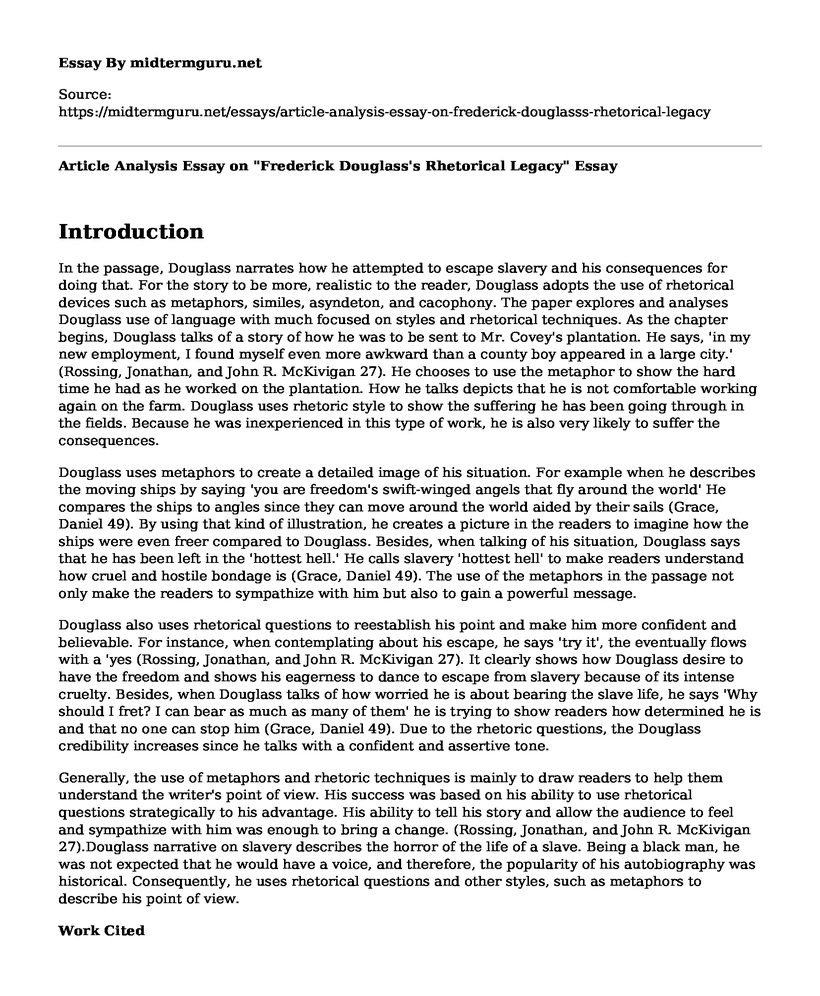Introduction
In the passage, Douglass narrates how he attempted to escape slavery and his consequences for doing that. For the story to be more, realistic to the reader, Douglass adopts the use of rhetorical devices such as metaphors, similes, asyndeton, and cacophony. The paper explores and analyses Douglass use of language with much focused on styles and rhetorical techniques. As the chapter begins, Douglass talks of a story of how he was to be sent to Mr. Covey's plantation. He says, 'in my new employment, I found myself even more awkward than a county boy appeared in a large city.' (Rossing, Jonathan, and John R. McKivigan 27). He chooses to use the metaphor to show the hard time he had as he worked on the plantation. How he talks depicts that he is not comfortable working again on the farm. Douglass uses rhetoric style to show the suffering he has been going through in the fields. Because he was inexperienced in this type of work, he is also very likely to suffer the consequences.
Douglass uses metaphors to create a detailed image of his situation. For example when he describes the moving ships by saying 'you are freedom's swift-winged angels that fly around the world' He compares the ships to angles since they can move around the world aided by their sails (Grace, Daniel 49). By using that kind of illustration, he creates a picture in the readers to imagine how the ships were even freer compared to Douglass. Besides, when talking of his situation, Douglass says that he has been left in the 'hottest hell.' He calls slavery 'hottest hell' to make readers understand how cruel and hostile bondage is (Grace, Daniel 49). The use of the metaphors in the passage not only make the readers to sympathize with him but also to gain a powerful message.
Douglass also uses rhetorical questions to reestablish his point and make him more confident and believable. For instance, when contemplating about his escape, he says 'try it', the eventually flows with a 'yes (Rossing, Jonathan, and John R. McKivigan 27). It clearly shows how Douglass desire to have the freedom and shows his eagerness to dance to escape from slavery because of its intense cruelty. Besides, when Douglass talks of how worried he is about bearing the slave life, he says 'Why should I fret? I can bear as much as many of them' he is trying to show readers how determined he is and that no one can stop him (Grace, Daniel 49). Due to the rhetoric questions, the Douglass credibility increases since he talks with a confident and assertive tone.
Generally, the use of metaphors and rhetoric techniques is mainly to draw readers to help them understand the writer's point of view. His success was based on his ability to use rhetorical questions strategically to his advantage. His ability to tell his story and allow the audience to feel and sympathize with him was enough to bring a change. (Rossing, Jonathan, and John R. McKivigan 27).Douglass narrative on slavery describes the horror of the life of a slave. Being a black man, he was not expected that he would have a voice, and therefore, the popularity of his autobiography was historical. Consequently, he uses rhetorical questions and other styles, such as metaphors to describe his point of view.
Work Cited
Rossing, Jonathan P., and John R. McKivigan. "Frederick Douglass's Rhetorical Legacy." (2018). Retrieved from: https://scholarworks.iupui.edu/bitstream/handle/1805/18499/Rossing
Grace, Daniel. "Infidel America: Puritan Legacy and Antebellum Religious Persecution in Frederick Douglass's Transatlantic Speeches, 1841-49." American Literature 90.4 (2018): 723-752. Retrieved from: https://read.dukeupress.edu/american-literature/article-abstract/90/4/723/136795
Cite this page
Article Analysis Essay on "Frederick Douglass's Rhetorical Legacy". (2023, Feb 05). Retrieved from https://midtermguru.com/essays/article-analysis-essay-on-frederick-douglasss-rhetorical-legacy
If you are the original author of this essay and no longer wish to have it published on the midtermguru.com website, please click below to request its removal:
- How the Ancient America Was Discovered and Populated - History Paper Example
- Fiedlers Contingency Model - Management Essay Sample
- Essay on Identification and Description of Niccolo Machiavelli
- Literary Analysis Essay on "Punished by Rewards" by Alfie Kohn
- Slave Trade and the Functioning of Enlightenment - Essay Sample
- Teddy Roosevelt: America's Youngest and Most Impactful Leader - Essay Sample
- Epidemiology of PTSD: Prevalence Across Countries - Research Paper







